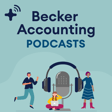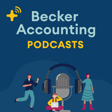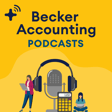
Cool Careers in Accounting Ep. 17 - Charting a New Path as an Entrepreneur in Accounting with Ryan Watson
Ryan Watson, a partner at Upsourced Accounting, joins host Spencer Payne to share his journey from starting as a CPA at a major firm to founding his own advisory practice. Watson discusses the challenges and rewards of entrepreneurship, highlighting his decision to leave a traditional career path for a fulfilling role as a strategic advisor. Learn from his unique experiences and success stories as he demonstrates the value created from providing strategic advisory services as an entrepreneur.
Earn CPE by listening to this podcast through a Becker Prime CPE subscription.
Listen to this episode through your Becker LMS platform to complete practice questions, pass the final exam, and earn CPE credit.
Already a Becker Prime CPE customer? Login here.
Have access to Becker CPE through your employer? Earn CPE credit for this podcast however you consume Becker CPE, either through your company’s LMS or via the Becker platform. Not sure where to log in? Check with your CPE admin.
Learn more about CPE Podcasts from Becker: https://www.becker.com/cpe/becker-podcasts


